-
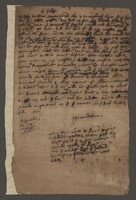 Phineas Pemberton, Ralph Pemberton, June 12, 1670
Phineas Pemberton, Ralph Pemberton, June 12, 1670 Letter dated June 12, 1670 (June 2, 1670 Old Style) from Phineas Pemberton—then imprisoned in Lancaster Castle—to his father, Ralph Pemberton.
-
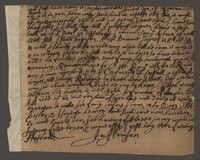 James Harrison, Ann Harrison,
James Harrison, Ann Harrison, Letter from James Harrison to his wife, Ann Harrison, regarding business and social matters. James Harrison updates his wife on the status of their fellow Friends, including one Friend who hopes that he will not lose his land while in prison. Due to their unwillingness to swear oaths, Quakers often could not conduct business with non-Friends. As a result, Quaker business and social networks were often very connected.
-
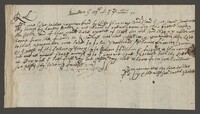 James Harrison, Roger Longworth via Brian Hodgson, June 2, 1670
James Harrison, Roger Longworth via Brian Hodgson, June 2, 1670 Letter dated June 2, 1670 (May 23, 1670 Old Style) from James Harrison to Roger Longworth regarding business and social matters. Harrison sends his regards to the Friends imprisoned within Lancaster Castle. James Harrison and Roger Longworth were shoemakers by trade, and both moved within extensive Quaker social networks.
-
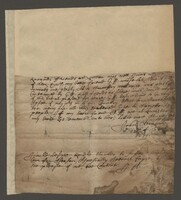 John Abraham, , May 27, 1670
John Abraham, , May 27, 1670 A fragment of a letter dated May 27, 1670 (May 17, 1670 Old Style) from John Abraham, discussing plans to disperse papers written by George Fox throughout Manchester and to give to them to magistrates. He sends his love and regards to Margaret Fell in Lancaster.
-
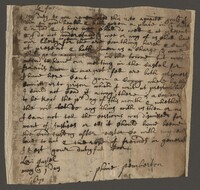 Phineas Pemberton, Ralph Pemberton, May 11, 1670
Phineas Pemberton, Ralph Pemberton, May 11, 1670 Letter dated May 11, 1670 (May 1, 1670 Old Style) from Phineas Pemberton to his father, Ralph Pemberton. He tells his father about his recent imprisonment in Lancaster Castle, that he does not know when he will come home, and being met with treatment "something harsh & cruel." Despite being told to not attend a meeting in town, Phineas intends to hold a meeting with two fellow Friends imprisoned alongside him, Margaret Fell and Francis Dunn: Initially, they were to be tried at a court session on the second Tuesday after Easter, but lack of judges postponed the trial until the 10th day of this month (May 20 New Style). It is accompanied by a facsimilie written by Caroline Pemberton.
-
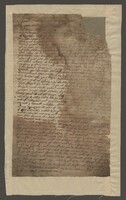 Roger Longworth, Thomas Manwarings via Edward Alcocke, April 4, 1679;May 5, 1679
Roger Longworth, Thomas Manwarings via Edward Alcocke, April 4, 1679;May 5, 1679 A manuscript copy of a paper dated either April 4 or May 5, 1679 (March or April 25, 1679 Old Style) written by Roger Longworth from Chester Castle to Thomas Manwarings. A warrant was issued for Longworth's arrest on February 28, 1678 (Old Style) in Holme, Chester due to suspicion of him being a Catholic. Following his arrest, he was asked to take an oath of allegiance which he refused. Beliefs held by members of the Society of Friends prevent them from doing so, as Longworth explains in his paper. Additionally, he expresses not receiving equal justice under the law.
-
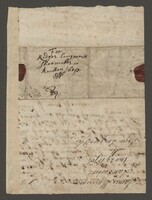 James Harrison, Roger Longworth, April 8, 1670
James Harrison, Roger Longworth, April 8, 1670 Letter dated April 8, 1670 (March 29, 1670 Old Style) from James Harrison in Lancaster to Roger Longworth in Bolton. In it, Harrison tells Longworth about money he has given to James Wright and George Norris.
-
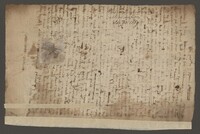 Phineas Pemberton, Ralph Pemberton, February 9, 1669
Phineas Pemberton, Ralph Pemberton, February 9, 1669 Letter dated February 9, 1669 (January 30, 1669 Old Style) from Phineas Pemberton to his father, Ralph Pemberton, concerning his impending appearance at court following his arrest with several others for holding a meeting at Nehimiah Poole's house. Phineas asks if his father can come to Manchester in nine days. The purpose of the visit will be to assuage Phineas' mistress before his upcoming trial and to assure her that his father cares about him. Phineas makes it clear the visit is not for his sake as he views imprisonment as a test of faith. Phineas warns his father that his mistress might try to get Ralph to appear on Phineas' behalf. However, he does not want his father to appear on his behalf because of an oath his father might be required to take. Quaker belief prevented Friends from taking oaths, and not taking the oath subjected Friends to fines, forfeiture of goods, and imprisonment.
-
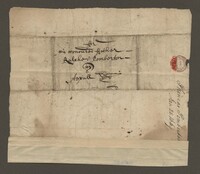 Phineas Pemberton, Ralph Pemberton, February 4, 1669
Phineas Pemberton, Ralph Pemberton, February 4, 1669 Letter dated February 4, 1669 (January 25, 1669 Old Style) from Phineas Pemberton to Ralph Pemberton, both members of the Society of Friends. It concerns Phineas' arrest with several others by the constable for holding a meeting at Nehimiah Poole's house. They were taken to the town hall and questioned by justices of the peace.
-
James Harrison, William Leth, and Joseph Macon, , July 24, 1669
Theological essay dated July 9, 1669 (9 5mo. 1669 Old Style) written by James Harrison and in conversation with William Leth and Joseph Macon. It expounds on Quaker doctrine and contains numerous Biblical references and allusions.
-
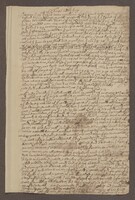 James Harrison, William Leth and Joseph Macon, July 24, 1669
James Harrison, William Leth and Joseph Macon, July 24, 1669 Theological essay dated July 24, 1669 (July 14, 1669 Old Style) written by James Harrison and in conversation with William Leth and Joseph Macon. It expounds on Quaker doctrine and contains numerous Biblical references and allusions.
-
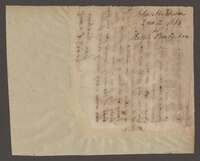 John Abraham, Ralph Pemberton, April 22, 1665
John Abraham, Ralph Pemberton, April 22, 1665 Letter of invitation dated April 22, 1665 (April 12, 1665 Old Style) from John Abraham to Ralph Pemberton. Abraham wishes Pemberton to send word when he plans to be in town, so that Abraham may be at home to see him.
-
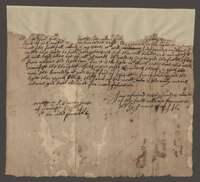 James Harrison and Edward Bourne, a Friend, March 31, 1663; April 1, 1663
James Harrison and Edward Bourne, a Friend, March 31, 1663; April 1, 1663 Two letters dated March 31, 1663 (March 21, 1663 Old Style) and April 1, 1663 (March 22, 1663 Old Style) from James Harrison and Edward Bourne to a fellow Friend, written from Worcester Jail. They wish to dispel the many false accusations laid upon them, namely their dishonoring of the Lord. There is also a mention of something Harrison said concerning the Church of England. Harrison and Bourne, along with John Cartwright, were arrested while at Bourne's house. They maintain they were charged wrongfully, and wish not to be defamed for words they did not say.
-
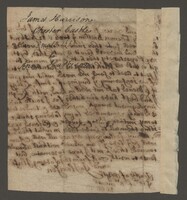 James Harrison, Ann Harrison, October 28, 1666
James Harrison, Ann Harrison, October 28, 1666 Letter written from jail dated October 28, 1666 (October 18, 1666 Old Style) from James Harrison to his wife, Ann Harrison. Hearing she has not been well, he asks her to send word at her next opportunity. He talks about his shoemaking business, his employees Edward Lingard and Roger Longworth, and impending employment. Finally, he assures her of both his health and those imprisoned with him, and sends her his love.
-
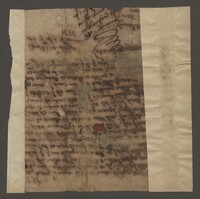 James Harrison, Ann Harrison, September 17, 1666
James Harrison, Ann Harrison, September 17, 1666 Letter dated September 17, 1666 (September 7, 1666 Old Style) from James Harrison to Ann Harrison. In this letter to his wife, James Harrison discusses aspects of his shoemaking business. He mentions Edward Lingard who is willing to help his apprentice, Roger Longworth. Harrison also mentions his not yet starting a customer's order.
-
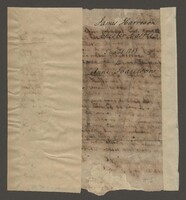 James Harrison, Ann Harrison, July 31, 1666
James Harrison, Ann Harrison, July 31, 1666 Letter dated July 31, 1666 (July 21, 1666 Old Style) from James Harrison to his wife, Ann Harrison. He is discussing her upcoming visit to him, accompanied by his daughter Phebe and his employee, Edward Lingard.
-
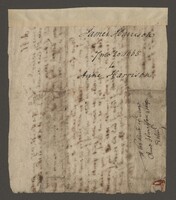 James Harrison, Ann Harrison, September 30, 1665
James Harrison, Ann Harrison, September 30, 1665 Letter dated September 20, 1665 (September 30, 1665 Old Style) from James Harrison to his wife, Ann Harrison. He expresses his happiness at hearing she is doing well.
-
James Harrison, Judge Thomas Wild,
Written from Worcester Jail to a local judge, this letter details the some of the persecution that Quakers faced, such having goods and property seized from them. Another form of persecution mentioned is frequent imprisonment: for actively engaging in the practice of the faith, or randomly on suspicion of being a Quaker and being associated with the sect and its members. Money was sometimes demanded for the return of the items if return was offered at all, and was also demanded as payment of bail to release imprisoned Friends.
-
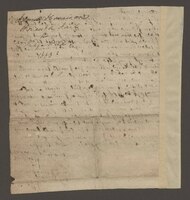 James Harrison, Judge Thomas Wild, [April 1663]
James Harrison, Judge Thomas Wild, [April 1663] Letter dated 1664 (1663 Old Style) from James Harrison to Judge Thomas Wild, regarding the seizure of his horse and other possessions following his arrest and imprisonment. This letter details some of the persecution that Quakers faced, such as having goods and property seized. Another form of persecution mentioned is frequent imprisonment: for actively engaging in the practice of the faith, or randomly on suspicion of being a Quaker and being associated with the sect and its members. Money was sometimes demanded for the return of the items, if return was offered at all, and was also demanded as payment of bail to release imprisoned Friends.
-
 Ann Harrison, James Harrison, 1655
Ann Harrison, James Harrison, 1655 Copy of an excerpt of a letter from Ann Harrison to James Harrison. The letter is in Phineas Pemberton's handwriting. Note on the back identifies the recpient as the brother of the sender. However, the content of the letter and the similarity of signature likely make the sender Ann Harrison, his wife.
 Phineas Pemberton, Ralph Pemberton, June 12, 1670 Letter dated June 12, 1670 (June 2, 1670 Old Style) from Phineas Pemberton—then imprisoned in Lancaster Castle—to his father, Ralph Pemberton.
Phineas Pemberton, Ralph Pemberton, June 12, 1670 Letter dated June 12, 1670 (June 2, 1670 Old Style) from Phineas Pemberton—then imprisoned in Lancaster Castle—to his father, Ralph Pemberton. James Harrison, Ann Harrison, Letter from James Harrison to his wife, Ann Harrison, regarding business and social matters. James Harrison updates his wife on the status of their fellow Friends, including one Friend who hopes that he will not lose his land while in prison. Due to their unwillingness to swear oaths, Quakers often could not conduct business with non-Friends. As a result, Quaker business and social networks were often very connected.
James Harrison, Ann Harrison, Letter from James Harrison to his wife, Ann Harrison, regarding business and social matters. James Harrison updates his wife on the status of their fellow Friends, including one Friend who hopes that he will not lose his land while in prison. Due to their unwillingness to swear oaths, Quakers often could not conduct business with non-Friends. As a result, Quaker business and social networks were often very connected. James Harrison, Roger Longworth via Brian Hodgson, June 2, 1670 Letter dated June 2, 1670 (May 23, 1670 Old Style) from James Harrison to Roger Longworth regarding business and social matters. Harrison sends his regards to the Friends imprisoned within Lancaster Castle. James Harrison and Roger Longworth were shoemakers by trade, and both moved within extensive Quaker social networks.
James Harrison, Roger Longworth via Brian Hodgson, June 2, 1670 Letter dated June 2, 1670 (May 23, 1670 Old Style) from James Harrison to Roger Longworth regarding business and social matters. Harrison sends his regards to the Friends imprisoned within Lancaster Castle. James Harrison and Roger Longworth were shoemakers by trade, and both moved within extensive Quaker social networks. John Abraham, , May 27, 1670 A fragment of a letter dated May 27, 1670 (May 17, 1670 Old Style) from John Abraham, discussing plans to disperse papers written by George Fox throughout Manchester and to give to them to magistrates. He sends his love and regards to Margaret Fell in Lancaster.
John Abraham, , May 27, 1670 A fragment of a letter dated May 27, 1670 (May 17, 1670 Old Style) from John Abraham, discussing plans to disperse papers written by George Fox throughout Manchester and to give to them to magistrates. He sends his love and regards to Margaret Fell in Lancaster. Phineas Pemberton, Ralph Pemberton, May 11, 1670 Letter dated May 11, 1670 (May 1, 1670 Old Style) from Phineas Pemberton to his father, Ralph Pemberton. He tells his father about his recent imprisonment in Lancaster Castle, that he does not know when he will come home, and being met with treatment "something harsh & cruel." Despite being told to not attend a meeting in town, Phineas intends to hold a meeting with two fellow Friends imprisoned alongside him, Margaret Fell and Francis Dunn: Initially, they were to be tried at a court session on the second Tuesday after Easter, but lack of judges postponed the trial until the 10th day of this month (May 20 New Style). It is accompanied by a facsimilie written by Caroline Pemberton.
Phineas Pemberton, Ralph Pemberton, May 11, 1670 Letter dated May 11, 1670 (May 1, 1670 Old Style) from Phineas Pemberton to his father, Ralph Pemberton. He tells his father about his recent imprisonment in Lancaster Castle, that he does not know when he will come home, and being met with treatment "something harsh & cruel." Despite being told to not attend a meeting in town, Phineas intends to hold a meeting with two fellow Friends imprisoned alongside him, Margaret Fell and Francis Dunn: Initially, they were to be tried at a court session on the second Tuesday after Easter, but lack of judges postponed the trial until the 10th day of this month (May 20 New Style). It is accompanied by a facsimilie written by Caroline Pemberton. Roger Longworth, Thomas Manwarings via Edward Alcocke, April 4, 1679;May 5, 1679 A manuscript copy of a paper dated either April 4 or May 5, 1679 (March or April 25, 1679 Old Style) written by Roger Longworth from Chester Castle to Thomas Manwarings. A warrant was issued for Longworth's arrest on February 28, 1678 (Old Style) in Holme, Chester due to suspicion of him being a Catholic. Following his arrest, he was asked to take an oath of allegiance which he refused. Beliefs held by members of the Society of Friends prevent them from doing so, as Longworth explains in his paper. Additionally, he expresses not receiving equal justice under the law.
Roger Longworth, Thomas Manwarings via Edward Alcocke, April 4, 1679;May 5, 1679 A manuscript copy of a paper dated either April 4 or May 5, 1679 (March or April 25, 1679 Old Style) written by Roger Longworth from Chester Castle to Thomas Manwarings. A warrant was issued for Longworth's arrest on February 28, 1678 (Old Style) in Holme, Chester due to suspicion of him being a Catholic. Following his arrest, he was asked to take an oath of allegiance which he refused. Beliefs held by members of the Society of Friends prevent them from doing so, as Longworth explains in his paper. Additionally, he expresses not receiving equal justice under the law. James Harrison, Roger Longworth, April 8, 1670 Letter dated April 8, 1670 (March 29, 1670 Old Style) from James Harrison in Lancaster to Roger Longworth in Bolton. In it, Harrison tells Longworth about money he has given to James Wright and George Norris.
James Harrison, Roger Longworth, April 8, 1670 Letter dated April 8, 1670 (March 29, 1670 Old Style) from James Harrison in Lancaster to Roger Longworth in Bolton. In it, Harrison tells Longworth about money he has given to James Wright and George Norris. Phineas Pemberton, Ralph Pemberton, February 9, 1669 Letter dated February 9, 1669 (January 30, 1669 Old Style) from Phineas Pemberton to his father, Ralph Pemberton, concerning his impending appearance at court following his arrest with several others for holding a meeting at Nehimiah Poole's house. Phineas asks if his father can come to Manchester in nine days. The purpose of the visit will be to assuage Phineas' mistress before his upcoming trial and to assure her that his father cares about him. Phineas makes it clear the visit is not for his sake as he views imprisonment as a test of faith. Phineas warns his father that his mistress might try to get Ralph to appear on Phineas' behalf. However, he does not want his father to appear on his behalf because of an oath his father might be required to take. Quaker belief prevented Friends from taking oaths, and not taking the oath subjected Friends to fines, forfeiture of goods, and imprisonment.
Phineas Pemberton, Ralph Pemberton, February 9, 1669 Letter dated February 9, 1669 (January 30, 1669 Old Style) from Phineas Pemberton to his father, Ralph Pemberton, concerning his impending appearance at court following his arrest with several others for holding a meeting at Nehimiah Poole's house. Phineas asks if his father can come to Manchester in nine days. The purpose of the visit will be to assuage Phineas' mistress before his upcoming trial and to assure her that his father cares about him. Phineas makes it clear the visit is not for his sake as he views imprisonment as a test of faith. Phineas warns his father that his mistress might try to get Ralph to appear on Phineas' behalf. However, he does not want his father to appear on his behalf because of an oath his father might be required to take. Quaker belief prevented Friends from taking oaths, and not taking the oath subjected Friends to fines, forfeiture of goods, and imprisonment. Phineas Pemberton, Ralph Pemberton, February 4, 1669 Letter dated February 4, 1669 (January 25, 1669 Old Style) from Phineas Pemberton to Ralph Pemberton, both members of the Society of Friends. It concerns Phineas' arrest with several others by the constable for holding a meeting at Nehimiah Poole's house. They were taken to the town hall and questioned by justices of the peace.
Phineas Pemberton, Ralph Pemberton, February 4, 1669 Letter dated February 4, 1669 (January 25, 1669 Old Style) from Phineas Pemberton to Ralph Pemberton, both members of the Society of Friends. It concerns Phineas' arrest with several others by the constable for holding a meeting at Nehimiah Poole's house. They were taken to the town hall and questioned by justices of the peace. James Harrison, William Leth and Joseph Macon, July 24, 1669 Theological essay dated July 24, 1669 (July 14, 1669 Old Style) written by James Harrison and in conversation with William Leth and Joseph Macon. It expounds on Quaker doctrine and contains numerous Biblical references and allusions.
James Harrison, William Leth and Joseph Macon, July 24, 1669 Theological essay dated July 24, 1669 (July 14, 1669 Old Style) written by James Harrison and in conversation with William Leth and Joseph Macon. It expounds on Quaker doctrine and contains numerous Biblical references and allusions. John Abraham, Ralph Pemberton, April 22, 1665 Letter of invitation dated April 22, 1665 (April 12, 1665 Old Style) from John Abraham to Ralph Pemberton. Abraham wishes Pemberton to send word when he plans to be in town, so that Abraham may be at home to see him.
John Abraham, Ralph Pemberton, April 22, 1665 Letter of invitation dated April 22, 1665 (April 12, 1665 Old Style) from John Abraham to Ralph Pemberton. Abraham wishes Pemberton to send word when he plans to be in town, so that Abraham may be at home to see him. James Harrison and Edward Bourne, a Friend, March 31, 1663; April 1, 1663 Two letters dated March 31, 1663 (March 21, 1663 Old Style) and April 1, 1663 (March 22, 1663 Old Style) from James Harrison and Edward Bourne to a fellow Friend, written from Worcester Jail. They wish to dispel the many false accusations laid upon them, namely their dishonoring of the Lord. There is also a mention of something Harrison said concerning the Church of England. Harrison and Bourne, along with John Cartwright, were arrested while at Bourne's house. They maintain they were charged wrongfully, and wish not to be defamed for words they did not say.
James Harrison and Edward Bourne, a Friend, March 31, 1663; April 1, 1663 Two letters dated March 31, 1663 (March 21, 1663 Old Style) and April 1, 1663 (March 22, 1663 Old Style) from James Harrison and Edward Bourne to a fellow Friend, written from Worcester Jail. They wish to dispel the many false accusations laid upon them, namely their dishonoring of the Lord. There is also a mention of something Harrison said concerning the Church of England. Harrison and Bourne, along with John Cartwright, were arrested while at Bourne's house. They maintain they were charged wrongfully, and wish not to be defamed for words they did not say. James Harrison, Ann Harrison, October 28, 1666 Letter written from jail dated October 28, 1666 (October 18, 1666 Old Style) from James Harrison to his wife, Ann Harrison. Hearing she has not been well, he asks her to send word at her next opportunity. He talks about his shoemaking business, his employees Edward Lingard and Roger Longworth, and impending employment. Finally, he assures her of both his health and those imprisoned with him, and sends her his love.
James Harrison, Ann Harrison, October 28, 1666 Letter written from jail dated October 28, 1666 (October 18, 1666 Old Style) from James Harrison to his wife, Ann Harrison. Hearing she has not been well, he asks her to send word at her next opportunity. He talks about his shoemaking business, his employees Edward Lingard and Roger Longworth, and impending employment. Finally, he assures her of both his health and those imprisoned with him, and sends her his love. James Harrison, Ann Harrison, September 17, 1666 Letter dated September 17, 1666 (September 7, 1666 Old Style) from James Harrison to Ann Harrison. In this letter to his wife, James Harrison discusses aspects of his shoemaking business. He mentions Edward Lingard who is willing to help his apprentice, Roger Longworth. Harrison also mentions his not yet starting a customer's order.
James Harrison, Ann Harrison, September 17, 1666 Letter dated September 17, 1666 (September 7, 1666 Old Style) from James Harrison to Ann Harrison. In this letter to his wife, James Harrison discusses aspects of his shoemaking business. He mentions Edward Lingard who is willing to help his apprentice, Roger Longworth. Harrison also mentions his not yet starting a customer's order. James Harrison, Ann Harrison, July 31, 1666 Letter dated July 31, 1666 (July 21, 1666 Old Style) from James Harrison to his wife, Ann Harrison. He is discussing her upcoming visit to him, accompanied by his daughter Phebe and his employee, Edward Lingard.
James Harrison, Ann Harrison, July 31, 1666 Letter dated July 31, 1666 (July 21, 1666 Old Style) from James Harrison to his wife, Ann Harrison. He is discussing her upcoming visit to him, accompanied by his daughter Phebe and his employee, Edward Lingard. James Harrison, Ann Harrison, September 30, 1665 Letter dated September 20, 1665 (September 30, 1665 Old Style) from James Harrison to his wife, Ann Harrison. He expresses his happiness at hearing she is doing well.
James Harrison, Ann Harrison, September 30, 1665 Letter dated September 20, 1665 (September 30, 1665 Old Style) from James Harrison to his wife, Ann Harrison. He expresses his happiness at hearing she is doing well. James Harrison, Judge Thomas Wild, [April 1663] Letter dated 1664 (1663 Old Style) from James Harrison to Judge Thomas Wild, regarding the seizure of his horse and other possessions following his arrest and imprisonment. This letter details some of the persecution that Quakers faced, such as having goods and property seized. Another form of persecution mentioned is frequent imprisonment: for actively engaging in the practice of the faith, or randomly on suspicion of being a Quaker and being associated with the sect and its members. Money was sometimes demanded for the return of the items, if return was offered at all, and was also demanded as payment of bail to release imprisoned Friends.
James Harrison, Judge Thomas Wild, [April 1663] Letter dated 1664 (1663 Old Style) from James Harrison to Judge Thomas Wild, regarding the seizure of his horse and other possessions following his arrest and imprisonment. This letter details some of the persecution that Quakers faced, such as having goods and property seized. Another form of persecution mentioned is frequent imprisonment: for actively engaging in the practice of the faith, or randomly on suspicion of being a Quaker and being associated with the sect and its members. Money was sometimes demanded for the return of the items, if return was offered at all, and was also demanded as payment of bail to release imprisoned Friends. Ann Harrison, James Harrison, 1655 Copy of an excerpt of a letter from Ann Harrison to James Harrison. The letter is in Phineas Pemberton's handwriting. Note on the back identifies the recpient as the brother of the sender. However, the content of the letter and the similarity of signature likely make the sender Ann Harrison, his wife.
Ann Harrison, James Harrison, 1655 Copy of an excerpt of a letter from Ann Harrison to James Harrison. The letter is in Phineas Pemberton's handwriting. Note on the back identifies the recpient as the brother of the sender. However, the content of the letter and the similarity of signature likely make the sender Ann Harrison, his wife.